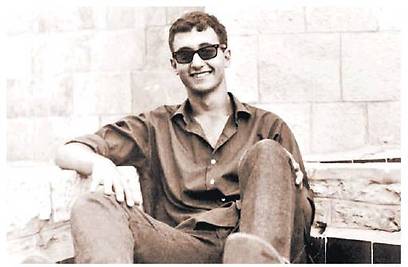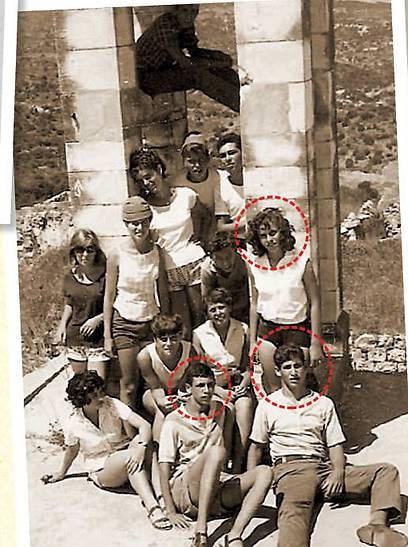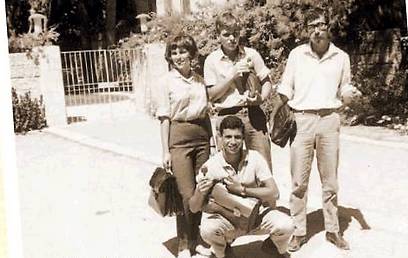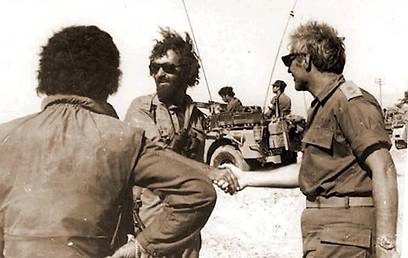Ariel Barzilay and Benjamin Netanyahu developed a close friendship during Bibi’s summer vacations in Jerusalem in the 1960s, and kept in touch after he returned to America. Now, 40 years after Barzilay was killed in the Yom Kippur War, his family offers a rare peek into the prime minister’s teenage years through the letters they wrote to each other.
It happened three months after Yonatan (Yoni) Netanyahu was killed in Operation Entebbe. The doorbell rang at the Barzilay home in Jerusalem. When Tova Barzilay opened the door, she found Benjamin Netanyahu standing at the entrance with a pile of letters he wished to hand over to her.
For eight years, alternately, since 1965, Netanyahu had corresponded with Ariel Barzilay, Tova’s son, about almost everything – youth, parties, romance, emigrating from Israel, politics. The young Netanyahu had lived in the United States some of those years, and his yearning for Jerusalem and the friends he left behind can be detected between the lines.
Barzilay and Netanyahu were pen pals, and in the summers, when Netanyahu visited Israel, they would meet with the other young members of their group. But this friendship came to a sudden end during the Yom Kippur War, when Barzilay was killed in action shortly after crossing the Suez Canal.

Three years later, in 1976, Netanyahu gathered the letters, wrote a dedication of several lines and handed them to Barzilay’s mother.
“Dear Tova,” Netanyahu wrote. “While searching for Yoni’s letters, I found this letter from Ariel. Clearly now, more than ever, the value of these traces is clear to me – because apart from memories and letters, there is so little left that can be passed on to other, so that they will also know. And it’s important for Roee to get to know Ariel and draw power and inspiration from him, just like it’s important for me that my children will get to know, really know, my brother Yoni. All the best, Bibi.”
For decades, the letters exchanged between Barzilay and Netanyahu lay in cases in his parents’ house. After Ariel’s mother died, the letters were handed over to his sister, Anat Keinan.
This year, as part of the Israel Museum’s 50th anniversary celebrations, Anat found a picture of Ariel and his friends from 1965 in one of the museum’s exhibitions. The picture raised interest and opened a window to the special group of young boys and girls from the Gymnasia Rehavia high school in Jerusalem, and uncovered the correspondence between Barzilay and Netanyahu.
Between the letters and the words, some black and white photos can be found. One of them shows Bibi half lying on the floor as his first wife, Miki, stands behind him; another features the good friends Uzi, Ariel, Bibi and Mati lying together on a hay cart at a work camp. Lighthearted, filled with passion and life. They were the successful group of Gymnasia Rehavia. Good children from a good school at a time of innocence and freedom. The city was divided at the time, and when they enlisted after the Six-Day War, no one even imagined another war.

“We were together until we enlisted,” says Prof. Beller, Ariel and Bibi’s childhood friend. “Jerusalem was a small city, shortly before the Six-Day War. There was something really innocent and sympathetic during that period. Every summer we would go to work camps.
“Ariel looked extremely older than everyone. He would also shave from an early age. We were quite a leading group. Ariel was much more poetic. We were much more realistic. We studied physics. He was an artist although he studied with us. The scientific subjects were not his strong side. He wrote songs and played music. He was more of a romanticist. We were kind of nerds, but very connected to the State. The Labor Movement, more or less.”
Were you interested in politics?
“Yes, very much. We had a few friends from the Beitar movement, but it didn’t feel like we were struggling with them. It wasn’t like today. Netanyahu’s father was affiliated with the Revisionists. I spent a lot of time in his house. His father would call everyone Bolsheviks. I didn’t even know what a Bolshevik was at the time.”
‘Bibi spent the summer in my house’
Netanyahu and Barzilay met through Beller and other friends in 1965. Ariel, who was originally from Rehovot, moved to Jerusalem with his family after his father was appointed governor of Jerusalem. The family settled in the Rehavia neighborhood, in the famous Villa Lea. He immediately got to know Beller, Eliezer Yaari and others, and they became a close group. The group also included Miki Weizman-Haran, who later became Netanyahu’s first wife and the mother of his oldest daughter, Noa.
Netanyahu was living with his family in the US at the time, but he arrived in Israel for vacations every summer and slept at his friends’ houses. That’s when Netanyahu and Barzilay developed their friendship and didn’t stop corresponding with each other.
“Bibi was a friend of mine from elementary school,” says Beller. “He and his family moved to the US, and in the summers he would live in my house and I would take him to the Scouts camp to hang out with the guys. That’s how he met his first wife, and that’s how Ariel got to know him too.
Netanyahu didn’t study in the Gymnasia, although he says he did. He would just come to be with us. During the summer vacations we would travel to work camps in the kibbutzim – in Beit Haemek, Beit Zera and others – and Bibi would join us.”
How did you and Ariel meet?
“Ariel joined us in the 10th grade. We studied in Gymnasia Rehavia together and I befriended him very quickly. We also lived pretty close to each other. We would hike a lot together. Ariel was a very positive person. He had charisma which couldn’t be ignored. It’s true that we were all successful, but there was something very charismatic, serious and responsible about Ariel.”
After Netanyahu returned to the US from his summer vacation in Israel, he and Ariel began corresponding. In a letter from February 1967, Barzilay wrote to Netanyahu:
“Memories… memories… remember… a lot to remember. We remember everything. It’s a bit strange and unpleasant to think that this is the last summer we could fool around and make a mess like animals and see ourselves as small children who are allowed to do anything. It’s a bit strange and unpleasant to know that at the end of this year we’ll be entering a harsh and fatal discipline of an army, efforts of a body we are not exactly familiar with. We won’t be allowed to do strange things, because they don’t befit a grownup person. We will have to be like everyone, with long trousers, polished shoes. No, no, it’s just unpleasant.
“To the last word, this was written yesterday, on Friday evening, until my girlfriend arrived and we went to a party. Today it’s Saturday morning. I am starting to study for an exam in analytical engineering. There was a party at Fefferman’s. It was great. I will conclude here. It’s raining outside, it’s February, I must go study. So long, Ariel.”
“It was difficult for us to deal with it,” Ariel’s sister, Anat, explains why they only just started to sort the memories left behind by Ariel.
“My mother and I would open a box, read a letter and shed a tear. That’s why we also couldn’t deal with commemoration evenings and events. When you see the pictures, you understand what a special group they were. Bibi and Beller and Ariel were attached to each other in the summer. When we marked 30 years since Ariel was killed, Bibi was supposed to come and in the end it was too complicated security-wise, so he called me and we spoke about Ariel a bit.
“Throughout the years, I said that I don’t want to close this circle. Something in me said that I want to leave this channel open all the time. After the 30th anniversary event in Ariel’s memory, I was all shaken up. I was in a terrible storm of emotions after that evening. I am a teacher and I remember walking to school so I could cry. It was very difficult.”
Netanyahu in a left-wing home
His move to the US disconnected Netanyahu from his best friends. He shared his difficulties and loneliness in his letters to Barzilay, and didn’t spare words. Netanyahu studied in a high school in Cheltenham, Philadelphia and was active in the debate club. But while his reality became completely American, his heart remained in Rehavia with Barzilay, Beller and Yaari.
On September 20, 1965, he wrote a letter to Ariel from the US, demonstrating how much he would like to be in Jerusalem with them:
“Hello Barzil! Listen, I returned from school pretty desperate, pondered and idled away for half an hour and then decided it was time to do my homework. I went to my father’s room to get a new pen and found instead of it on the table – a letter from you! In a flash my mood changed and I began screaming ‘hello’ excitedly, kicking the furniture, scratching the walls… Don’t think I’m exaggerating. I haven’t been this satisfied in a long time, and I mean it. In short, I immediately sat down to answer you.
“The truth is that the situation here, although it is depressing, isn’t as bad as I thought it would be. Last week I had pretty serious nightmares, but very quickly, when school began, I no longer have time for these things (tough, my friend). I am starting to see the wheels turn and time passing by. In my leisure time I miss and remember the exact things you mentioned. You are right: It really was my most successful summer. Let’s hope the next one will be even better (by the way, I don’t want you to escape to Rehovot during the vacation, because I want to spend quite a lot of time with you. Even two months. Is that clear?)
“You tell me – I understand from all kinds of sources that you really being tormented in the scientific classes. Miki wrote to me that you have dangerous mind bullies, while you and Buz (Beller) are praising some Romanian-speaking grown creature. If he causes any trouble, we’ll take care of him together during the summer (we can also add Piker to project).”

“Bibi would come to Israel during his vacations, and we had a very open house. He stayed with us,” Anat recalls. “I still remember I would give up my room sometimes. It was very natural because many friends arrived. We didn’t make a big deal out of it.”
Do you remember their group?
“Of course. I was two years younger than them. They were very grownup teens, very curious, intellectual and very mischievous. Ariel would keep Bibi updated on what was happening in Israel. They were very involved and yet very socially active.”
How was your relationship?
“My feeling is always a feeling of loss, that we didn’t utilize it to the fullest. We had a very strong connection. We were opposites. Ariel was a combination of an intellectual and a man of action. Both feet on the ground but very artistic on the other hand – he wrote, painted, took pictures. Very curious. He was interested in everything.”
Did you keep in touch with his friends later on?
“I did with Uzi Beller and with Eliezer Yaari, but not with Netanyahu. He was more in touch with my mother. I met him later the US in the 1980s, but it wasn’t the same.
“Look, it’s no secret that we come from a left-wing home. The fact that Bibi spent time in our house doesn’t turn it into something different. I believe that Ariel would have gone to the peace camp as well. Look, our parents were Givati fighters during the War of Independence – my mother was a medical assistant and my father was an officer. They knew that friends were getting killed and paying a price, but they believed that at least their children wouldn’t. And then Ariel was killed and it all collapsed.”
‘It’s no secret that Bibi planned to stay in America’
On the Jerusalem-US route, the letters also raise questions about the issue of emigration from Israel. A moment before their upcoming enlistment, Barzilay and Netanyahu argue. In a letter dated April 2, 1967, Barzilay asks Netanyahu about his future plans in Israel:
“As for your university, I see that you’re an organized fellow and that you are taking care of your future. If so, I dare ask you what are your plans for the longer term. Do you have plans to stay in the US or just an intermediate station again? You know, I am not attracted by overseas at all. I think that since my future lies in this country, it’s clear that everything it can provide me with is more than enough, and I ask you not to take this lightly, because the level in Israel is not low in any way! (Especially in high school!) By the way, do you know that Israel is first in mathematical studies in the world? And that’s based on tests taken by delegations from several dozen countries, including the US. I should note that the eastern countries were not included, and they are a considerable mathematical force. Well, I’ve had enough of talking about studies. In general, there is almost no news.”
In the next letter, sent a month and a half later, on May 16, Barzilay tries to emphasize what he said:
“I’m rushing to answer for two reasons: A) you asked me to; and B) you somewhat angered me, so I am rushing to fill in the void that has been created. An American or British band called The Animals sang a song called, ‘Please, Don’t Let Me Be Misunderstood.’
“All that is left for me is to sing it out loud. It’s true that your intellectual way resides permanently in the way I think. I never doubted the fact that in order to create an opinion you must gather information about the sides and opinions, and after becoming proficient, make a ruling!… There is a certain difference between expressing an opinion and an impression. My impression in my current situation is that I am not attracted by overseas. It’s a simple story about my world of senses and not necessarily slander against anything beyond the border. I had no patriotic intention in that, and if you think it’s easy to sit in an armchair in Jerusalem and be a patriot, I hereby inform you that this is the situation, it’s difficult! Because emigration is in fashion, there are voices in favor of it. While they don’t exceed the more patriotic ones, they are heard and are not unusual (and I am convinced that you are personally familiar with the emigration problem). I am ending the problem here, and if you tried to raise an intellectual problem you encountered in my letter, I hope I have convinced you that you failed to understand the data of the problem, and it’s very simple!
“From patriotism to patriotism, we’re still on the same issue: Today is Independence Day!! The guys and I had a campfire picnic with 35 people, with kebab, hummus, pita bread, and cold, warm and alcoholic drinks. They sang and it was very joyful. By the way, the kebab was made by us and it’s something to be proud of. We prepared it on a charcoal barbecue, on embers. Very romantic. In school it’s starting to get busy and let’s hope it will be okay. In a month and a half it will all be behind us. So long. Yours, Ariel.”
“Bibi was a very mature student, but he was completely ‘Americano,'” says Beller. “Before Yoni was killed, he made plans to stay there at major stages. Many people suggested that he stay in American. Good Israelis who move to America and receive offers is not a rare thing. I also lived there and came back. So at the time Bibi had quite a few temptations to stay there.
“He graduated from business administration school. After completing his studies, he worked in a very large business consulting company, the Boston Consulting Group, and changed his last name to Nitay (the name his father sometimes used to sign his articles). It’s no secret that he planned to stay there, but then Yoni was killed and everything changed and he decided to come back.”
The summer that never arrived
In August 1967, Beller and Barzilay joined the 7th Brigade of the Armored Corps. Their friendship was so strong that Beller actually wrote a letter to the chief of staff and asked that his military service would be postponed so that he would be able to enlist together with Ariel.
That year, Netanyahu returned to Israel and joined the elite Sayeret Matkal unit. The three completed an officers’ course and were released from the army before the Yom Kippur War.
In 1973, Beller was studying medicine, Barzilay was studying architecture at the Technion – The Israel Institute of Technology, and Netanyahu was an architecture student at the Massachusetts Institute of Technology (MIT). Four months before he was killed in the Yom Kippur War, Barzilay wrote to Netanyahu and his wife Miki in America, after not being in touch for a long time:
“If you remember, Bibi, those days in which my doorbell rang and your were at the doorstep. You came straight from the plane to grab something to eat and a bed to sleep. My letter is something of the kind, sort of bursting through an open door after a long period of separation. In such circumstances, you always know that the person who is bursting wants something.
“Back to the issue: Uzi asked me at the time, on your behalf, if you should come to the Technion to study architecture. My answer was and remains absolutely not. On the other hand, I would like to ask you an opposite question. Since I will be in the US in a year and a half (in other words, in the summer of 1974), I thought about inquiring on further architecture options in the US…”
Barzilay never reached that summer. Before the Yom Kippur War broke out, he was called up and enlisted with the classified “White Bear unit.” When the war began, he crossed the Suez Canal and was killed in a difficult battle.
“An evening before the canal parachuting, I drove and saw the ‘White Bear’ vehicles,” Beller recalls. ‘They were Russian APCs. I passed them one by one and surprisingly ran into Ariel. It was a very exciting meeting. We hugged and kissed. Listen, it was a difficult war there. We said goodbye. Several hours earlier he met Major-General Shlomo (“Chich”) Lahat, his father’s good friend.” The picture with Chich is the last memento Ariel left behind.

“I arrived with the squadron in the city of Suez,” Beller continues. “It was at the end of the war. I sat in an observation post and wrote postcards. I also sent one to Ariel’s mother, telling her about our meeting. We were very close. I was a frequent visitor at their home. But the postcard arrived the day she was informed that he was missing, and she believed that I had seen him and that he might be alive. There was a great drama there. When I went on leave they announced that he had probably been killed.
“It was the first time I had lost a close friend. We were a very impressive group. In the four years since Ariel’s arrival until the army we were always together. Listen, it’s like a brother. In his memorial event I arrived to deliver a speech and I suffocated… I just couldn’t.”
What about Netanyahu? Are you still friends?
“We don’t see each other. During Operation Protective Edge I called to support him, and he really got back to me back very fast. We spoke for about half an hour.
“A month ago I decided to have a conversation with him about political issues, and he knows I’m in the left, so it’s no big deal. He found an hour for me in the morning on a working day and we sat for a whole hour and I told him what I think he should do. It was very pleasant. The atmosphere was very friendly. It’s hard to be alone up there. For me it was exciting company because we hadn’t been alone for a long time. The tone changes, from the serious tone.
“I miss that period very much. It was one of the happiest times in my life. I imagine most people have a good youth, bur for me it was very special.”
Ariel’s story is documented in the “Israel Revealed to the Eye” project – a communal initiative documenting family albums of the Yad Ben Zvi institute and the Landmarks national heritage program at the Prime Minister’s Office. The albums will soon be integrated into the Israel Archives Network at the National Library. Visit the website at http://www.israelalbum.org.il/english/ .
As reported by Ynetnews
